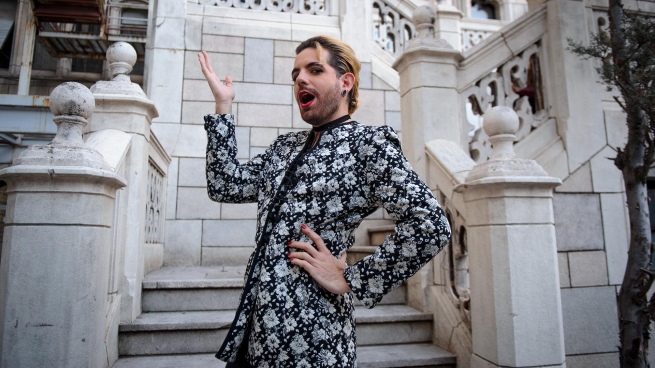the chair of dissenting chant of the University of the Arts (UNA) fulfilled, on the eve of the tenth anniversary of the enactment of the Gender Identity Law, its first anniversary as a pioneering space for lyrical training with a non-binary perspectiveand celebrated it with the conviction of “raise these different vocalities to continue shouting the things that hurt us”.
“We do not know where Tehuel is, we ask for the vindication of our disappeared, in memory of Lohana Berkins, Diana Sacayán and Marlene Wayar, and of so many who gave their lives to enforce laws of which we are proud. This chair is for all of them, He is a dissident and militant of this group”affirmed in dialogue with Télam the head of the matter, the singer and trans artivist Luchi of Gyldenfeldt.

Graduated from UNA in 2017, the holder of Canto Disidente ended her academic career as a baritone, although she would later consolidate her record as a countertenor as a member of queer operathe project that he carries out with his sister, Fernywho managed to get the traditional Cosquín Folklore Festival to cancel the categories of “female voice” and “male voice” in its 2021 contest.
It was through that experience that By Gyldenfeldt he devised the expansion of this gaze on the vocalities that are not identified with the binary construction of genres towards pedagogy, towards a training that escapes the labels historically installed in this field.

“Lyrical singing is crossed by culture and biology, which determined what vocal registers a person would have according to the genitalia with which they were born. Vulva: soprano, mezzo, contralto. Penis: tenor, baritone or countertenor, as a rather androgynous exception, as it is the voice of the castrated”explained the teacher.
And in that sense, he pointed out: “The origin of opera has to do with that history, and I think we have to open our heads and hearts a little, and allow ourselves to be surprised by all the vocalities of all the people who want to study singing”.
“Our transvestite companions look at the university from the corner, at most they recognize that space as a university but they are systematically excluded.”Luchi of Gyldenfeldt
Coinciding with the first decade since the enactment of Law 26,743 by the National Congress, which recognized the right of everyone to change their records according to their self-perceived identity, the singer spoke with this agency about the first year of the matter and his look on the actuality of the lyric.
Télam: How did the chair come about?
Luchi de Gyldenfeldt: It was a proposal in response to a concern from the Music and Gender Commission, of which I am a part as a university graduate, and from Ópera Queer. During the pandemic I reflected on the importance of this program, and it is something that we share with other universities. We were facing a time when the university had to make concrete policies so that the word inclusion would stop being an empty word for many of our existences, to stop being the exception and leave this system for those of us who ran and run systematically of that cis-sexual heteronorm.
T: Is there any similar experience in another national or international university?
LDG: We know that this is the first chair of dissident lyrical singing in the world, there is no other that compares for its project, because it is designed with all these other rainbow identities, as I like to say, so that you know that we can rest in this trench in things that we need dissidence, respect for our pronouns, our vocalities and processes. It seems to me that the UNA is betting on a futuristic chair, which although it is a historical claim, is thinking about children and embracing free childhoods. We want them to be able to have another institutional path that most of the dissidences did not have, because we saw the universities as something impossible or we have received ourselves with a lot of pain, going through situations of mistreatment and violence.
T: How is the voice linked to the construction of identity?
LDG: The Gender Identity Law speaks of the right to comprehensive health, and is also speaking of the right to vocal freedom, to one’s own voice, to search, to health, to institutions having a commitment to find within of them the spaces and the methods to summon those searches. I believe that the chair was born with this objective, embraced by the Law, and tries to be a concrete and forceful tool so that people can get closer to follow the path that they have to begin to travel, because that is also what it is about, running away from the impositions. It is a range of possibilities and that is the path that we propose, it is a matter of accompanying and listening.
T: How is the chair projected a year after its start?
LDG: I think that only now the chair is beginning to dream, taking into account that we started virtually, with leaving the walls of the university a little and opening ourselves up, being represented in all scientific spaces. It is military that they give us a little power to be and share the experience, and to see how it can be replicated, to become aware that from these places we can show solidarity and distribute the tools to generate empowerment. Our collective has a historical wound regarding these spaces, we have always said it because we have seen it. Our fellow transvestites look at the university from the corner, at most they recognize that space as a university but they are systematically excluded. To begin to live it is to begin to share it, to make it visible, to begin to spread the word that this space exists and belongs to everyone, everyone and everyone.
T: What is the process that you think lyrical singing spaces are going through?
LDG: Today I see it positively, I believe that the lyrical world is going to gain in social representativeness if it has the capacity to readjust to the social changes of the present. Ferni, my sister, always reminds me of the New Songbook, where there was this conception that culture is constantly changing because society changes, so we will have to start talking about something else in popular music, to generate empathy with the people who listen to it. If the lyric continues to be maintained as a museum and always represents the same stories in the same way, without modifying any genre at all in a forceful way, I think it will deteriorate in terms of massiveness. That’s why I think it’s time to change, with the respect that old works deserve and understanding that they are part of our cultural heritage, but betting that people change and we can’t just create an opera about heteronormative love and think that dissidence we are going to want to go see it at the theater. We are not represented, neither in our gender identities nor in the way we think about romantic love today, among many other things.


















